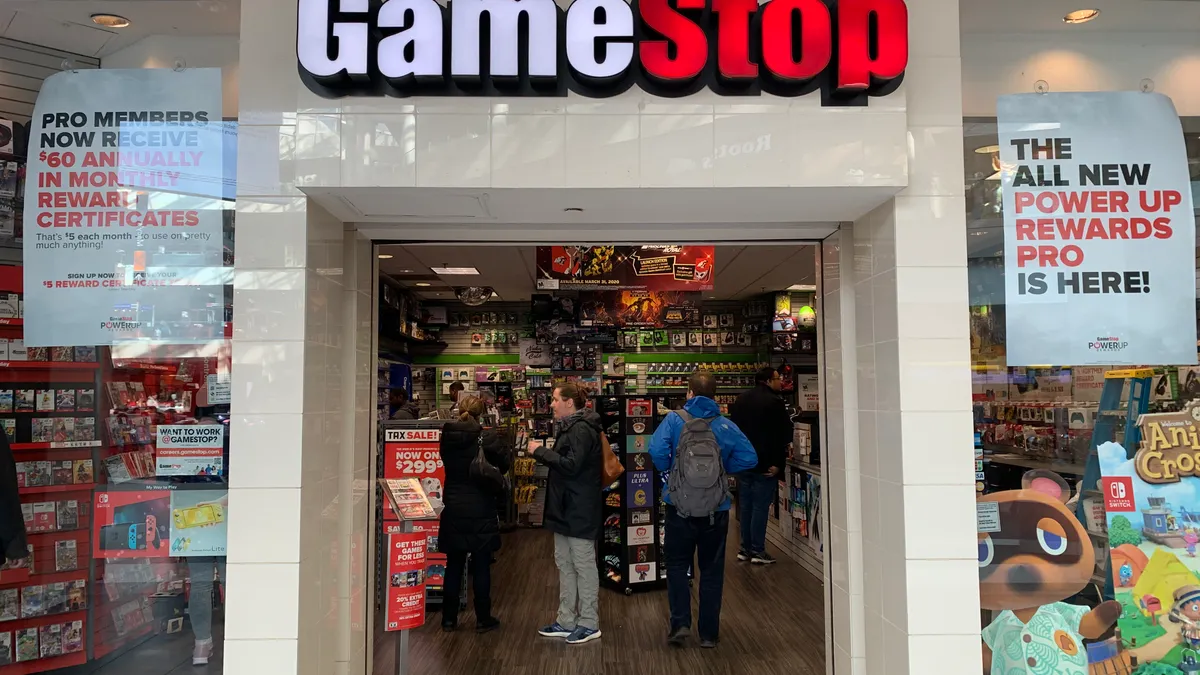Dive Brief:
- GameStop filled two of its most important open C-suite positions with Amazon veterans as the company works toward a digital makeover and reported first-quarter sales growth of about 25%.
- The gaming retailer tapped Matt Furlong, former head of Amazon's Australia business, as CEO. Furlong, who replaces the departing George Sherman, starts June 21.
- GameStop simultaneously announced the appointment of Mike Recupero as CFO. Recupero, former CFO of Amazon's North American Consumer business, replaces Jim Bell, who resigned earlier this year, as permanent CFO.
Dive Insight:
GameStop has had a busy 2021 so far. With the appointment of Chewy co-founder Ryan Cohen to its board, following an activist stake he took in the company as an investor, GameStop has been shaking up its leadership in a quest for transformation.
Before joining the company, Cohen urged it to cease thinking like a traditional retailer and turn itself into a technology company. Neither then nor since has he elaborated much on what that might entail. He and allies have, however, already transformed the company at the management level.
After being appointed to the board, and then a special committee, Cohen has become chairman of GameStop. Alan Attal, another former Chewy executive, also joined the board and its transformation task force spearheaded by Cohen.
With a rash of recent appointments, GameStop also now has former Amazon leaders in its CEO, CFO and, with the appointment of Jenna Owens earlier this year, COO slots, as well as the chief growth officer role. Former Chewy, Zulily and Amazon executives have also been appointed to executive roles overseeing e-commerce, supply chain, marketing and merchandising.
GameStop has also bought itself some time to undertake an overhaul of its business. Not that long ago, the retailer faced a distressed situation as sales plummeted and losses mounted. Following a social media-driven surge in its stock this year, GameStop raised enough cash to pay off all its debt, with some left over to invest in its business. With its stock still trading many multiples higher than at the beginning of the year, GameStop filed a prospectus to sell another 5 million shares to investors, which it can then use to further fuel its transformation efforts.
GameStop has also made progress in its recovery from the pandemic year. In Q1, sales increased 25.1% to $1.3 billion with a store base 12% smaller than a year ago. While operating income remained negative, it narrowed by about 62%. The company also said that May sales were 27% over 2020.
As it raises cash, pays off debt and fills out its ranks with digital specialists, GameStop is still quiet about its short-term and long-term plans. For the second period in a row, the company didn't take analyst questions. While other retailers have begun releasing sales and profit estimates after last year's stark uncertainties, GameStop has issued no guidance. As the company's stock continues going through wild price gyrations unrelated to its performance, some analysts, including Telsey Advisory Group and Bank of America, have dropped the company from their coverage.
















